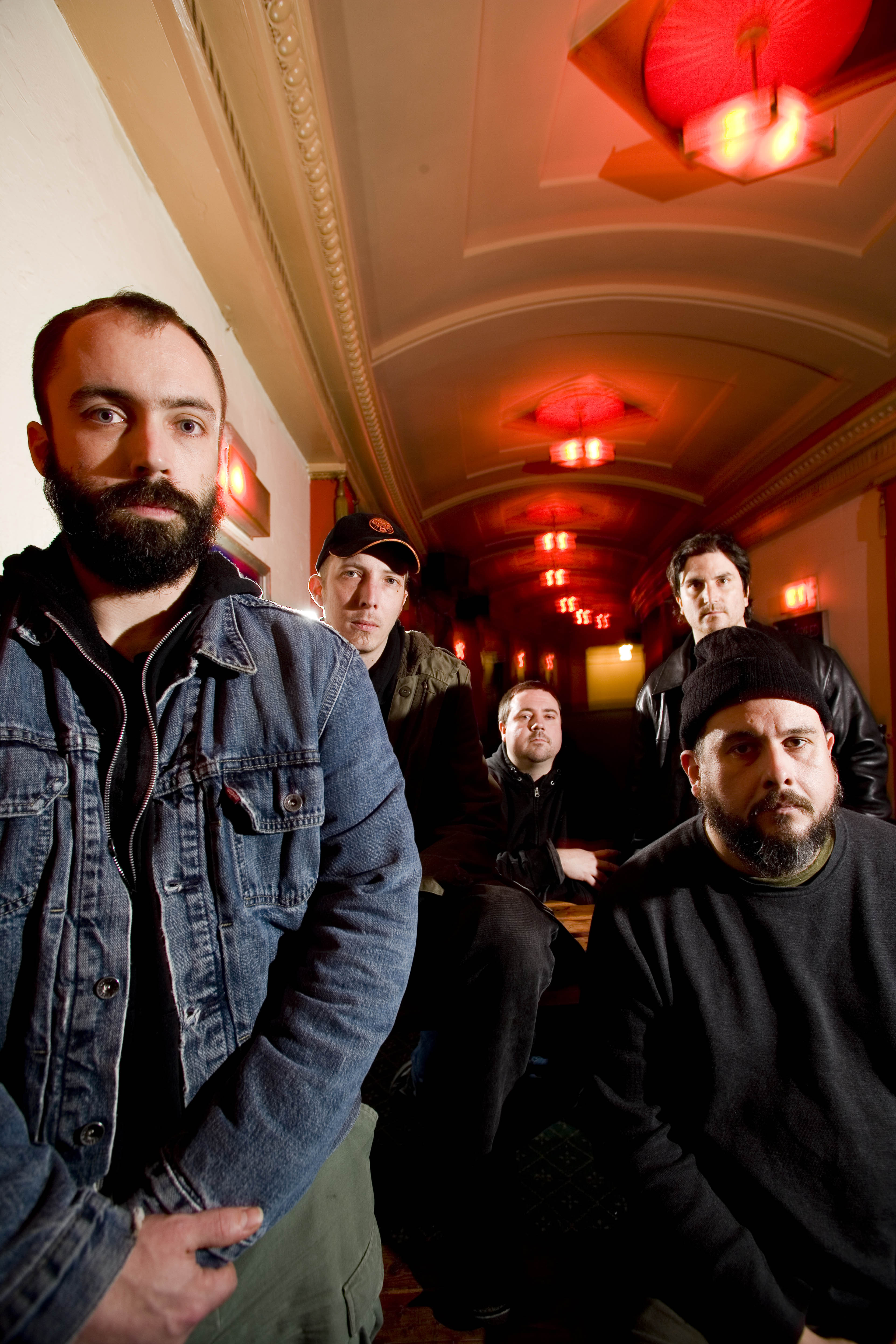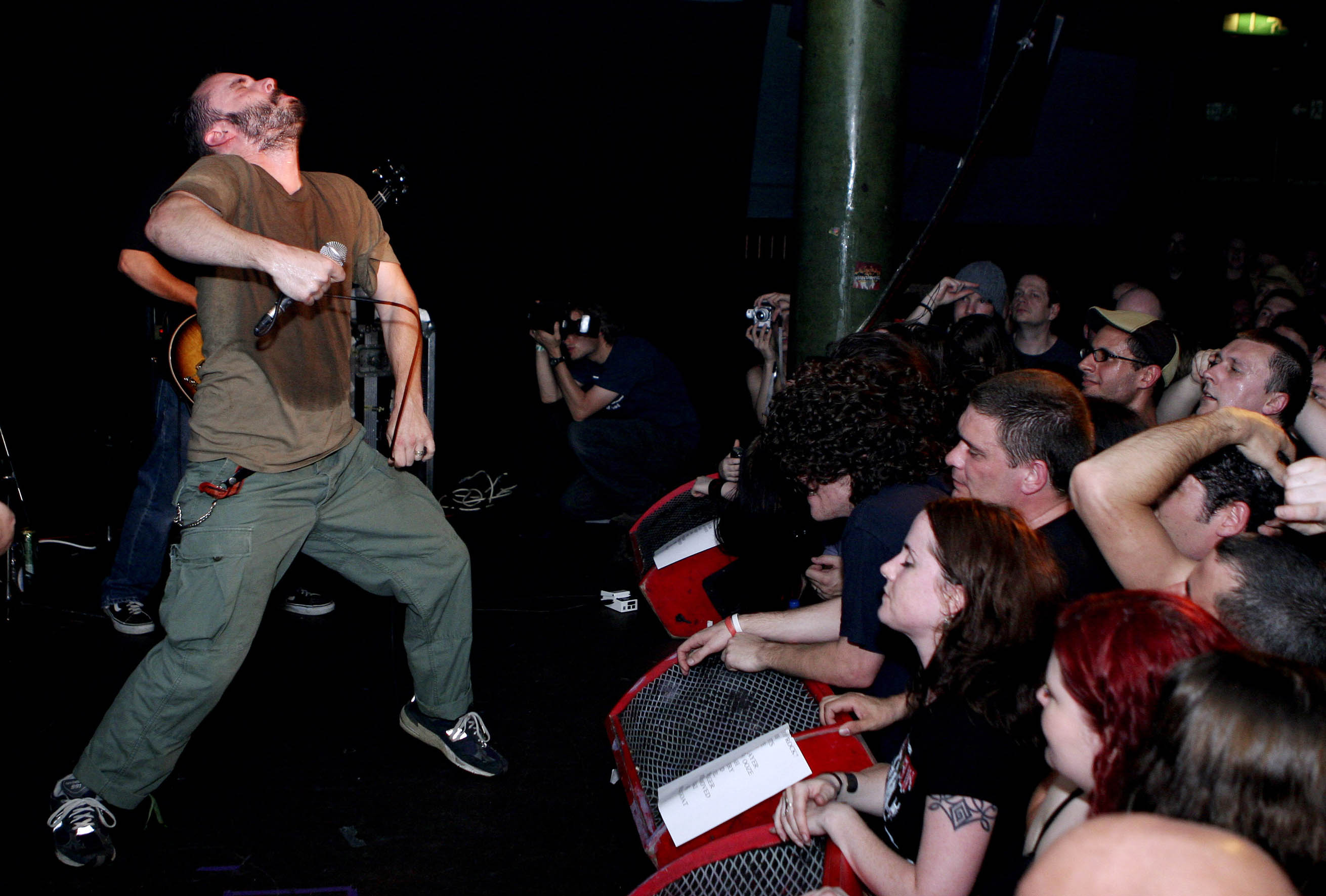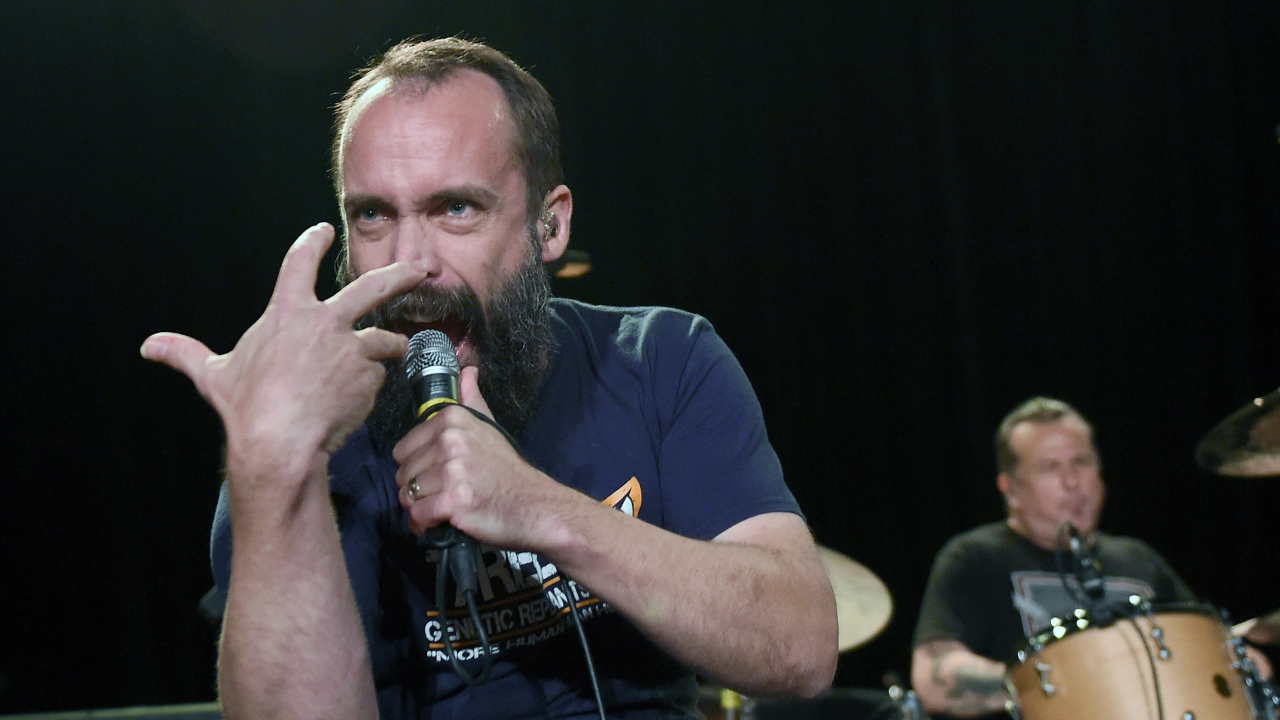Heavy metal is no country for old men. Hammer has just asked Clutch if they watch The Walking Dead, if the inclusion of The Regulator in the show has made any difference to their career, and whether they like horror movies generally.
The answers are: no, no, fuck no.
There’s an elephant in the room, a razorback boar in the back of this jacked-up Ford: we are three 40-something men sitting in a crap Camden hotel talking about horror films. Or rather, failing to talk about them.
Neil Fallon and Tim Sult of Clutch are on what probably feels like their 37th interview of the day. Tim eyes me with road-weary eyes and bristles. He has a face that says: “I am a 43-year-old man, thousands of miles from my family doing another interview with another asshole that’ll sit between pages about some Norwegian death metal band and some flavour-of-the- month fucking haircut band.”
He peers over a pint of Magners, no ice, with the look of Private Pyle from Full Metal Jacket at the end of his Basic Training, talking to his rifle and intent on bloodshed.
“Bus drivers often tell us that we are not like other bands,” says the rather more genial Neil. “Instead of watching TV or playing Xbox, we tend to sit around reading books. The bus is like a mobile library.”
So what books would they recommend to Hammer readers?
“Well, it’s not horror,” says Neil, “but Blood Meridian by Cormac McCarthy is a pretty disturbing read if you want real horror. It’s about scalp hunters on the Texas-Mexico border, middle of the 19th century. It’s not a true story but I think it’s the kind of thing that did happen.”
What about you, Tim? Private Pyle, startled, considers it and says, “Miles Davis’s autobiography.”
Hammer: “Why is it so good?”
Tim: “I dunno. It’s just his story.”
Hammer: “And he was quite a character, right?”
Tim: “Mmmm.”
Hammer: “So is it inspiring?”
Tim: “…”
Hammer: “Defiant? Funny? Why should Hammer readers read it?”
Tim: “I dunno. I haven’t read it for, like, 15 years…”
But, hey – at least he got a good anecdote out of it, right?
Drummer Jean-Paul Gaster and bassist Dan Maines are somewhere else relaxing. It’s just Neil, Tim and me. Metal Hammer has brought in an old guy to talk to the old guys.
They do this occasionally. Bring in us old fogies to lend our wisdom, share olde worlde analogue thinking with you Generation 2.0 types. Because it was different back in the 20th century, pre-internet, when music wasn’t emailed, streamed, or coming down a phone line. Back then you had to wait for music. You had to hunt and gather.

We were teens in the 80s, so we missed punk and NWOBHM but got all the fallout – hardcore, thrash, goth etc – and the false impression that everything pre-1977 was indulgent prog wiffle about castles and wizards. Trends came and went – grebo, shoegaze, industrial, grunge, nu metal – by which time you got tired of all that fad-driven crap and started loving ‘proper rock’ even more.
Stoner rock was the moment when all ‘that old rock shit’ from the 70s began to make sense to the generation that had missed it the first time: crunching riffs, wailing guitars; a dirty, bluesy groove whipped into shape by lashes of wah-wah. It was like Hendrix if he’d never come to London but had stayed locked in a basement in Seattle for 30 years, inviting Soundgarden and Alice In Chains round for endless jams.
Clutch transcended the ‘stoner’ tag pretty quickly. This wasn’t a sleepy-eyed Sabbath-tribute – it was something urgent, with hip-hop dynamics, jazz flourishes, bluesy grit and enough gigantor guitar parts to make any riff-lord nervous. But if they weren’t stoner, it wasn’t easy to define what they were.
“It’s difficult to talk about what Clutch is because I’m immersed in it,” says Neil. “We never really spoke about what we wanted the band to be or not be. But after the second album, it became apparent that we had stumbled upon our particular sound, the riff-based approach that we’ve been pursuing ever since.
“Anything that we listen to is a potential influence. JP and Tim listen to a lot of jazz. I like the blues. On the bus you might hear Dio, The Meters, Funkadelic, Rocky Erickson, Bad Brains, Notorious B.I.G., Three Man Army, King Tubby… I’d bet Clutch is an amalgamation of all we listen to, filtered through our own individual styles and abilities. It’s a Frankenstein.”
Like many of Frankenstein’s monsters, Clutch found themselves embraced by the metal scene. A scene notorious for bands that are shocking, debauched, dark and theatrical took to its hairy bosom a band that seem almost the opposite: thoughtful, aware and authentic (but still brilliantly brutal).
Neil: “I think at times, in the 90s, [at metal festivals] there was a collective attitude of ‘What the hell are we doing here?’ But where else could we have gone? Nowadays, I think it works to our advantage. Even diehard metal fans can grow weary of blast-beats for eight hours in the July sun. A lot of times, we are like the Allman Brothers in comparison to what has preceded us. And that is often a welcome break. There’s always a cadre of kids in corpse paint who can’t stand the fact that we’re trying to make them smile, but that amuses us.”
Twenty years after their first release, Clutch are still in love with rock’n’roll. New album Earth Rocker does not break from their template hugely, but it does deliver their strongest set of songs for a while. It was partly inspired by early rock’n’roll (on Crucial Velocity, Fallon references Rocket 88, the name of the Ike Turner-penned, Jackie Brenston song often pegged as the first ever rock’n’roll track) and by touring with another band who’re always-the-same-but-always- different: Motörhead.
“Lemmy’s inspirations are rockers like Little Richard and Chuck Berry,” says Neil, “and you can hear that in Motörhead. It’s just a lot louder and a lot faster. That was a big revelation for us.” So Clutch went back to the source. “It’s important to look to the first generation of rock’n’rollers as well as heavy metal,” he says. “A copy of a copy of a copy gets blurry. You have to go to the original for clarity.”

Not that Clutch have gone all Stray Cats/Reverend Horton Heat/ Jim Jones Revue. If anything, on Earth Rocker they sound fiercer than ever, Neil’s lyrics matching the fury of the music. Stand-out DC Sound Attack! is written in the vengeful voice of some pro-war nut-job (‘Trouble I love/Peace I do despise/I’m a warmonger baby/I got blood in my eyes/And I’m looking at you’) while Mr Freedom is an angry response to the hollow talk of politicians.
“I wrote that in the build-up to the last Presidential election,” he says. “People use this term ‘freedom’ until it doesn’t mean anything. ‘I’m for freedom!’ What does that mean? So it was a response to that orgasm of bullshit and rhetoric.” The title track is equally as scathing about people in bands moaning about their ‘hard life’, about being on tour, having to hit the road. “It’s aimed at them and at myself too, to remind myself that we’re blessed to be able to do this.
“The older I get the more appreciation I have for rock’n’roll. In some ways rock’n’roll’s become so accessible, so all pervasive, it’s easy to take it for granted. But it should be treated with respect and gratitude. It’s the closest thing to magic that we have.”
‘If you’re gonna do it, take it to the stage’, goes a line on the album and Clutch take it to the stage with style. It’s like an electrical current runs through the boards, directly into Neil, like he’s the conductor for a shock wave that’s been fizzing and sparking from Chess records to Vertigo, Def Jam and Dischord. He gurns and hollers like Screaming Jay Hawkins, Iggy-eyes popping, Joe Strummer’s jackhammer leg pumping away.
He is John Lee Hooker, Jim Morrison and Chuck D, the band heads-down-no-nonsense musos, playing in the sweet spot where Henry Rollins meets Sonny Rollins and Joe Perry meets Lee Scratch Perry. They’re a THC-propelled collision of Bad Brains and Captain Beyond, the sound of ZZ Top colliding with Fugazi.
I tell Neil that ZZ Top’s Billy Gibbons told Classic Rock that the best live band he had ever seen was Fugazi. Rick Rubin had taken him to see them in the 90s. Clutch could be the band borne out of Rick and Billy’s tequila-drenched fever dreams.
“I’d never have pegged Billy for a Fugazi fan!” laughs Neil. “I’ve never met him, no. I did pass by him backstage at Download, but I geeked out and ran off like a dummy. Both ZZ Top and Fugazi have had a big influence on Clutch.
“[Fugazi frontman] Ian MacKaye came out to our show in DC in December,” he says. “I think he had a false impression about us from back in the day, like we were a bunch of knuckleheads. Well, our early shows in DC were pretty knuckleheaded. It was great to meet the man and hopefully he left thinking we sounded a bit more like ZZ Top than he remembered.”
As they move from knuckleheads to elder statesmen, what can the seasoned vets of Clutch pass on to teenage metalheads?
“I’d tell them to never forget that rock’n’roll was once considered by many to be an imminent threat to Western civilisation,” says Neil.
“Albums were burned and censored. Performances were forbidden. People were beaten. In many places in the world today, that continues. The other night in Cologne we met a fan who had come from Islamabad to check out the gig. He described how they had underground listening parties.”
Underground metal shows. And when he says ‘underground’ we’re not talking figuratively. These guys could lose their lives but they do it anyway. That’s an Earth Rocker.
“The older I get, the more I appreciate how lucky I am to be part of this phenomenon. The one thing that has allowed us to keep it going this long is that we put music above all else. Music is its own reward. If you treat it as a vehicle to something else, some destination of fame and fortune, you’ll fail. If you hold music in the regard that it should be, with reverence, respect and awe, then you’ve already arrived.”
Back in that shit hotel in snowy London, Tim is looking over his cider at me. “I tell you what I’d like to read…” he sneers.
My gravestone, I’m thinking. Maybe the back of his eyelids. Possibly the back of my eyelids after he peels the skin off my skull and wears me like a mask.
“Ginger Baker’s autobiography.”
Ginger Baker: Cream drummer, hard-rock pioneer, jazzer, fusion maverick, ex-junkie, polo player. His book is great, I tell Tim: all heroin, fist fights and car crashes. And I’ve met him. He came to the Classic Rock Awards one year and I looked after him. At one point I saw him pacing, agitated, a 20-something girlfriend/wife and a kid in tow, so I asked if I could help.
“I’m looking for somewhere to smoke!” he barked.
I got him to follow me to the smoking area, a hoarding built out into the alley so no-one could see the gods of rock having a fag. Ginger sparked up and relaxed and then, as soon as the fag was out, started trying all the doors around him.
“What are you looking for?” I asked him.
“Where’s the fucking toilets?”
“The closest one is down where we’ve just come from,” I told him.
He looked at me like I’d just shat in his teacup. Then he pushed the hoarding aside, unzipped and pissed out into the street like a horse.
Clutch chuckle. “If I’d heard about him doing that when he was 19, I’d have thought he was a douche,” says Neil. “But hearing it about him now, in his 70s, he sounds like a hero.”
Maybe there’s hope for us old guys yet.

